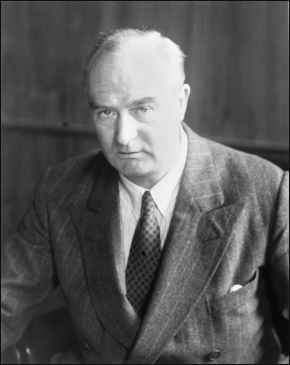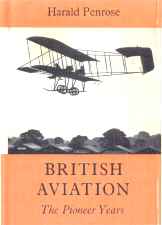
 |
|
Collection of Joe, 2-23-06 |
|
|
|
If your time is limited, you want to go directly to the story of Robert Blackburn. You can start there by clicking on: |
|
|
 |
British Aviation The Pioneer Years 1903-1914 Harald Penrose Product Details Unknown Binding: 308 pages Publisher: Putnam, London, 1967. Publisher: Cassell; Rev. ed edition (1980) Used Copies: Occasionally available online. ISBN: 0304302341 |
|
Description: This book records in great detail the work, struggles and achievemants from 1903 to 1914 of the British aviation pioneers whose foresight produced the weapons of aerial warfare for two major wars and the vehicles to spread air commerce and high-speed communication throughout the world. The author, an aeronautical engineer and test pilot, has had access to the unpublished papers of many of the pioneers and has undertaken immense research to produce the most detailed and analytical record of the early years. He describes the essential work of men like A. V. Roe, S. F. Cody, Frederick Handley Page, Geoffrey de Havilland, T. O. M. Sopwith, Hiram Maxim, George White, Robert Blackburn, Mervyn O'Gorman, Capper and others. He tells of their struggles against apathy and lack of finances and relates the aviation scene to the wider national and economic background. This is a fascinationg story of the recent past and one which should be read by all those now engaged in the various branches of aviation as well as all who are concetned about the national development of ideas and techniques. Many of the photographs which illustrate this volume have never before been published. Limited numbers of this book, used, are available online from time to time. It may also be found in a few, selected libraries. Lucky for us, Bob Davis has transcribed a few paragraphs from pages 440-441 which refer to Robert Blackburn. The text from those pages can be read immediately below. "We need a new arm to our Service; we need it urgently, and we shall need it more and more, and that arm is Research. We need to place enquiry and experiment upon a new footing, to enlist for them and organise them, to secure the pick of our young chemists and physicists and engineers, and to get them to work systematically upon the anticipation and preparation for our future war equipment. At present we spend from our national funds about 18-1/2 millions a year upon education, but 14-1/2 of this, supplemented by about as much again from local resources, is consumed in merely elementary teaching. So we spend only about 4 millions a year of public money on every sort of research and education above the simple democratic level. Nearly 30 millions for the foundation, and only a seventh for the edifice of will and science! Is it any marvel that, we show ourselves, in comparison with the more virile nations of the continent to be backwards, unorganised, unimaginative, unenterprising? Within the limits of finance which the little group of British aircraft companies could raise there was, very considerable initiative, though undirected to any common purpose except individual survival. As an example, the Blair-Atholl Aeroplane Syndicate had continued development of Dunne's tail-less machines at Eastchurch, managed by Dick Fairey on a shoe-string, and now succeeded in selling a constructional license to the French Astra Company. Similarly, Robert Blackburn, living from hand to mouth, had managed to sell one or two aeroplanes privately, and recently obtained an order for a fairly large single-seater monoplane for Cyril Foggin, a new enthusiast, and in its construction showed further early development, even though for cheapness there was reversion to wood construction. Robert Blackburn had been joined by a man of the same surname though unrelated, Harold Blackburn, who had learned to fly at Filey and then operated his namesake's Flying School at Hendon. Many week-ends were spent making exhibition flights in northern counties, and money from them and the school went a long way towards paying a draughtsman and the 14 or 15 men who Robert Blackburn managed to employ. One of his earliest helpers had gone, for Harry Goodyear, after a glorious spell of open-air freedom moving with Benny Hucks from town to town during exhibitions of Mercury, had joined the staff of A.V. Roe & Co., Ltd." |


|